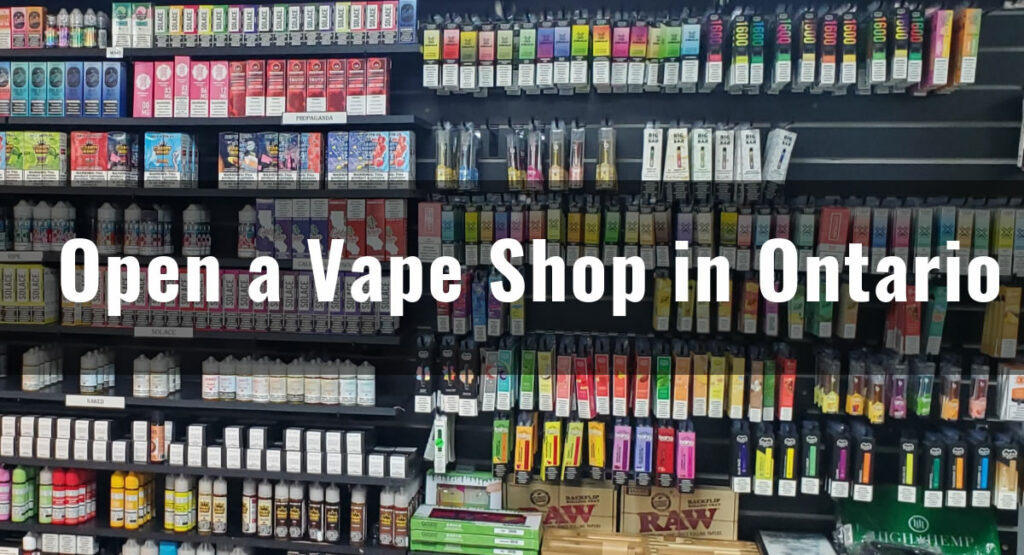The vaping industry in Ontario presents a lucrative opportunity for aspiring entrepreneurs. However, starting a vape shop requires careful planning and adherence to regulations. This comprehensive guide covers critical steps like conducting market research, creating a business plan, securing financing, obtaining licenses, and differentiating your shop. Follow these tips to launch and sustain a thriving vape business in Ontario.
Evaluating the Market Potential in Ontario
The first step is understanding Ontario’s vape shop landscape. The province’s vaping industry is undergoing rapid growth, projected to reach $380 million by 2025 according to ResearchAndMarkets. This presents a profit window for new vape retail stores. However, competition is stiffening, mandating that new shops differentiate themselves meaningfully.
Most existing vape stores focus their offerings on e-liquids, mods, and starter kits. Catering to various experience levels and nicotine needs is essential. Some stores also specialize in advanced setups for hobbyist vapers. As market saturation increases, new entrants should consider unique products like DIY e-liquid customization or exotic accessories imports to stand out. Educational workshops and loyalty programs also help attract customers.
Strict provincial regulations govern vape retail operations, including municipal business permits, age verification, marketing limitations, and health/safety standards. While daunting, embracing compliance builds customer trust. Conduct in-depth due diligence to understand all regulatory and licensing requirements before progressing.
Crafting a Strong Business Plan
A well-constructed business plan is the blueprint for your vape shop’s success. Thoroughly outline your operational and financial models. Key elements of an effective plan include:
- Defining your target customer demographics and optimal location to reach them. Center store design, inventory, and marketing around their preferences.
- Analyzing the competition’s pricing, offerings, strengths, and weaknesses. Identify where you can improve upon their model.
- Detailing startup costs, inventory purchasing budgets, and staffing requirements. Use conservative sales and growth estimates.
- Describing marketing tactics focused on your ideal customers. Integrate promotions across platforms like social media, paid ads, and in-store displays.
- Outlining business risks and mitigation strategies. Build contingencies for changing regulations, new competitors, and sales shortfalls.
Refine your business plan as you research the competitive landscape. Let it guide your startup process and operations.
Finding the Optimal Shop Location
Choosing the right vape shop location is crucial for attracting foot traffic and visibility. Consider factors like:
- Nearby demographics – Are your target customers prevalent in the area? Vape shops thrive around younger crowds.
- Competition density – Don’t cluster too closely with existing shops drawing the same audience.
- Accessibility – Pick spots near public transit hubs and with ample parking. Easy access retains customers.
- Commercial zoning – Avoid residential areas with occupational restrictions.
- Retail spaces – Seek affordable lease rates and flexibility for renovations.
- Future area growth – Upcoming developments like new housing or offices can fuel your customer base.
Visit and assess candidate areas at different times to gauge potential. Be ready to act quickly when you find the ideal vape shop location. Signing the lease is a major milestone.
Financing Your New Vape Shop
With a business plan in hand, you need capital to turn your vision into reality. Typical startup costs for a vape shop approach $100,000 – $200,000 between inventory, lease, renovations, equipment, licensing, and operating expenses until profitability. Assembling financing requires planning and perseverance.
Many new entrepreneurs self-fund or tap into personal networks for loans or investment to launch their business. However, outside financing options include:
- Small business loans/lines of credit – Government-backed loans through the Business Development Bank of Canada.
- Private lenders – Banks, credit unions, and alternative lenders provide financing for qualified applicants.
- Merchant cash advance – Receive an upfront lump sum in exchange for diverting a percentage of future sales.
- Crowdfunding – Platforms like Kickstarter or GoFundMe let you pitch your business to attract smaller investments from many backers.
Each option involves tradeoffs like interest rates, collateral, equity stakes, and repayment terms. Weigh them carefully and pursue multiple avenues if possible.
Obtaining Necessary Permits and Licenses
Before opening doors, your vape shop must comply with all relevant municipal, provincial, and federal regulations. This includes:
- Municipal business license – Register your vape shop with the city/town, usually through the clerk’s office.
- Selling tobacco license – Required in Ontario to retail any e-cigarette or vape products, available through the province.
- Public health unit approval – Submit a vape specialty store registration application to your local health unit.
- CRA business number – Register for taxes and payroll accounts federally via the Canada Revenue Agency.
- Fire and electrical approvals – Pass inspections related to the property’s safety systems and compliance.
- Signage permits – If installing visible outdoor signage, ensure it adheres to local ordinances.
Consult lawyers and accountants to ensure full compliance. Build good relationships with regulators and inspectors that oversee vape retail.
Differentiating Your Vape Shop
While mastering the fundamentals, don’t lose sight of what will set your vape shop apart. Consider focusing on:
- Customer experience – Create a welcoming space for vapers to learn and relax in. Hire knowledgeable staff who engage customers.
- Curated products – Carefully select your inventory based on local preferences. Avoid what competitors already offer.
- In-house branding – From labels to bags, customize elements with your unique brand identity.
- Omnichannel integration – Align your in-store and online retail experiences through your website and social media.
- Community events – Host classes, tastings, contests and other events that connect with customers.
- Loyalty program – Reward repeat customers and incentivize referrals to drive retention.
Standing out requires creativity and understanding your audience. Let your vape shop’s special sauce shine from day one.
- UK Announces Mandatory Vape Tax and Duty Stamps from 2027 - February 10, 2026
- Sri Lanka Travel 2026: Total Ban on Cigarettes & Vapes - February 5, 2026
- NY Tax Proposal: Hochul Targets ZYN with 75% Levy - January 29, 2026


